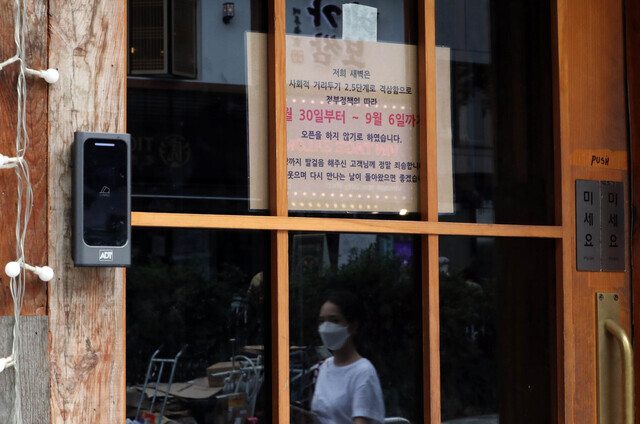hankyoreh
Links to other country sites 다른 나라 사이트 링크
[Editorial] Failure to contain COVID-19 this week will inevitably result in Level 3 social distancing

Measures by the Central Disaster and Safety Countermeasure Headquarters (CDSCHQ) to increase the social distancing regime to Level 2.5 went into effect at 12 am on Aug. 30. Scheduled to continue through Sept. 6, the new measures heavily restrict economic and social activity; for example, franchise coffee shops in the Seoul Capital Area (SCA) are permitted only to offer beverages for takeout or delivery. It’s a desperate step to avert a large-scale outbreak. More than ever, the situation calls for the public’s cooperation, participation, and patience.
According to the Korea Centers for Disease Control and Prevention (KCDC), confirmed cases of the virus were up by 299 from the day before as of midnight on Aug. 30. While the daily caseload was under 300 for the first time since the increase of 280 recorded on Aug. 25, this is still a critical situation where we cannot afford to be complacent. The virus has spread to every corner of South Korea, with infections reported that day by every one of the 17 metropolitan cities and provinces apart from North Jeolla Province.
This is a precarious time when the number of new cases could begin to soar at any moment. In a regular briefing, KCDC Director Jung Eun-kyeong stressed that this is a “serious crisis situation,” explaining that “transmission links have emerged in all areas of daily life, and [the virus] is spreading to the healthcare institutions and nursing facilities that we view as our ‘last defenses.’”
As of Aug. 29, over 1,000 cases had been confirmed in connection with Sarang Jeil Church in Seoul’s Seongbuk District, which has been the epicenter of the renewed outbreak; by noon on Aug. 30, that total was up to 1,035. Daegu reported 30 Cases on Aug. 29, the city’s highest single-day total since the Shincheonji outbreak back in February, from a church-centered cluster connected with an Aug. 15 rally in Seoul’s Gwanghwamun Square. Many other infections associated with church services have been emerging throughout South Korea.
Despite this situation, some Protestant churches have been disregarding the government’s guidelines mandating online services, insisting instead on in-person gatherings. Even more shockingly, some of them are failing to properly observe guidelines such as keeping a record of visitors. This sort of deplorable behavior has led to public denunciations of churches and South Korea’s Christian community as a whole -- even though the majority of them are faithfully complying with government disease control guidelines.
In addition to the ongoing church-related infections in the SCA and elsewhere and the rise in deaths and confirmed cases in senior citizens, another cause for deep concern is the growing percentage of so-called “mystery cases” for which no transmission route can be established. The proportion of mystery cases in the Seoul area rose all the way from 7.1% for the second week of August to 16.9% for the third week and 31.9% for the fourth. It’s a powerful warning signaling that any one of us could end up unwittingly becoming infected at any time.
We need to protect the safety of our family members and neighbors by wearing masks, washing our hands, and following other disease prevention guidelines, while also being patient and avoiding going out or meeting people for the time being. “It’s ironic, but the best way to show solidarity during the COVID-19 era is to stay separate and keep our distance from each other,” Jung said.
The intensified disease control measures, which are tantamount to Level 3, impose major restrictions on activities not only by coffee franchises but also by ordinary coffee shops, restaurants, bakeries, after-school academies, study rooms, and fitness centers. It’s worrying to think what a big blow this will mean for small business owners, the self-employed, and irregular workers. The administration needs to waste no time developing measures to support the businesses that have suffered as a result of social distancing. It should also get to work preparing a fourth supplementary budget.
Please direct comments or questions to [english@hani.co.kr]

Editorial・opinion
![[Column] When ‘fairness’ means hate and violence [Column] When ‘fairness’ means hate and violence](https://flexible.img.hani.co.kr/flexible/normal/500/300/imgdb/original/2024/0516/7417158465908824.jpg) [Column] When ‘fairness’ means hate and violence
[Column] When ‘fairness’ means hate and violence![[Editorial] Yoon must stop abusing authority to shield himself from investigation [Editorial] Yoon must stop abusing authority to shield himself from investigation](https://flexible.img.hani.co.kr/flexible/normal/500/300/imgdb/original/2024/0516/4417158464854198.jpg) [Editorial] Yoon must stop abusing authority to shield himself from investigation
[Editorial] Yoon must stop abusing authority to shield himself from investigation- [Column] US troop withdrawal from Korea could be the Acheson Line all over
- [Column] How to win back readers who’ve turned to YouTube for news
- [Column] Welcome to the president’s pity party
- [Editorial] Korea must respond firmly to Japan’s attempt to usurp Line
- [Editorial] Transfers of prosecutors investigating Korea’s first lady send chilling message
- [Column] Will Seoul’s ties with Moscow really recover on their own?
- [Column] Samsung’s ‘lost decade’ and Lee Jae-yong’s mismatched chopsticks
- [Correspondent’s column] The real reason the US is worried about Chinese ‘overcapacity’
Most viewed articles
- 1China calls US tariffs ‘madness,’ warns of full-on trade conflict
- 2[Column] US troop withdrawal from Korea could be the Acheson Line all over
- 3[Editorial] Yoon must stop abusing authority to shield himself from investigation
- 4[Column] When ‘fairness’ means hate and violence
- 5[Column] How to win back readers who’ve turned to YouTube for news
- 6US has always pulled troops from Korea unilaterally — is Yoon prepared for it to happen again?
- 7[Book review] Who said Asians can’t make some good trouble?
- 8Naver’s union calls for action from government over possible Japanese buyout of Line
- 9Could Korea’s Naver lose control of Line to Japan?
- 10[Editorial] Korea must respond firmly to Japan’s attempt to usurp Line